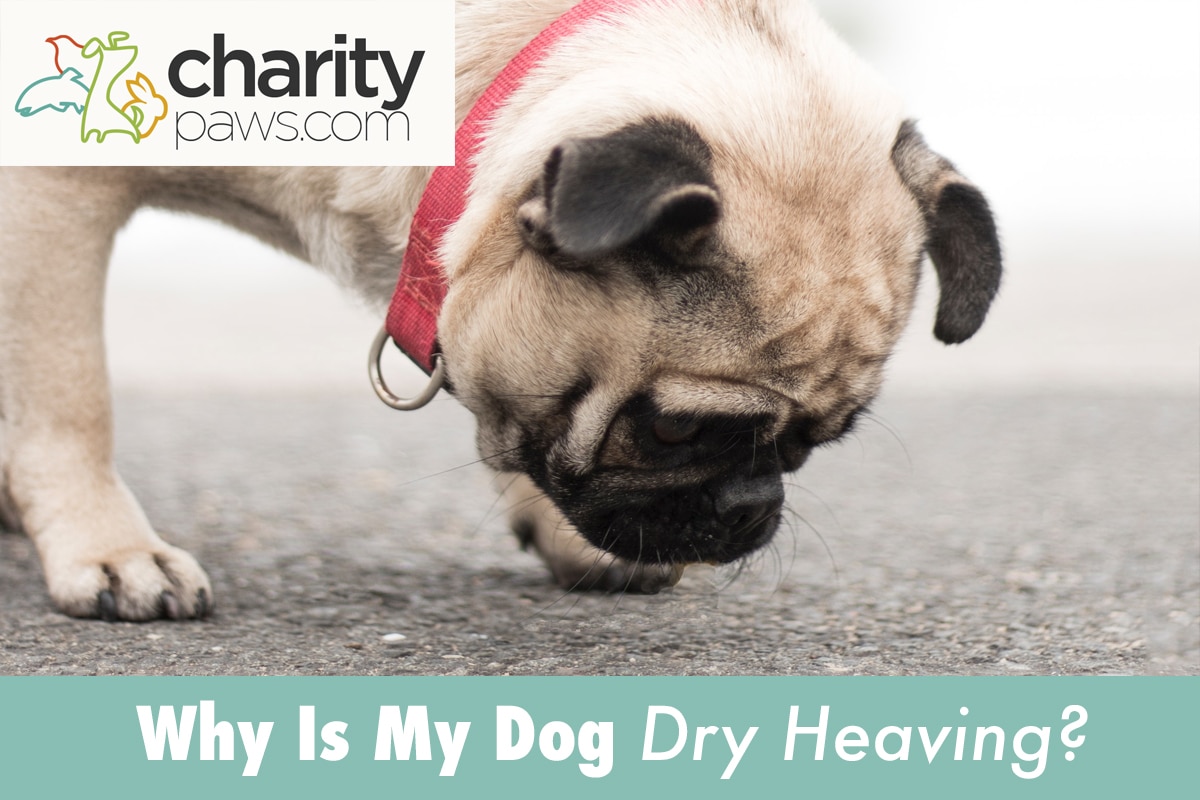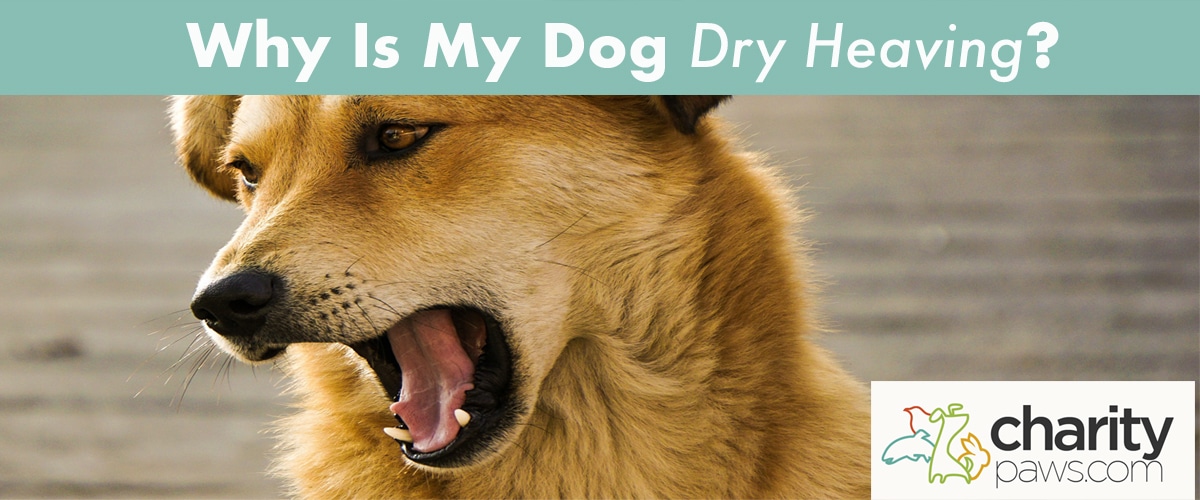It can be worrying if your dog keeps dry heaving as they often seem so uncomfortable and sick while it’s happening.
There are many different reasons why your dog might be doing this though, some more serious than others.
We will explore dry heaving in detail in this article as well as when you should seek help from your veterinarian.
What Is Dry Heaving

If your dog assumes a position where it looks like he’s going to vomit, but doesn’t actually bring anything up, then he is probably dry heaving.
During this time he will start having stomach contractions or spasms, and will appear hunched over, but not produce anything.
These violent contractions of your dog’s abdomen will help to differentiate dry heaving from other conditions like coughing or reverse sneezing.
Dogs may dry heave when they feel nauseous, or when they are trying to vomit but are physically unable to because of an obstruction.
They may, however, bring up a small amount of saliva with their attempts.
Dry heaving may be referred to as retching by some people.
Why Do Dogs Dry Heave?
There are several reasons why your dog might dry heave.
Here are some of the more common ones we see:
Your Dog Is Nauseous
If a dog feels nauseous then he might dry heave.
Nausea could be caused by a tummy upset, with episodes of vomiting seen alongside dry heaves.
Sometimes there are a couple of dry heaves before a vomit, or he might be retching after his stomach has already emptied because he’s got nothing left to bring up.
Many things can cause nausea including:
- Bacterial infections
- Dietary indiscretion (eating things he shouldn’t such as, discarded food or manure)
- Parasites
- Viral infections
- Underlying liver or kidney disease
- Dietary sensitivities
- Inflammatory bowel disease
- Pancreatitis
With many of these conditions, you may see other signs alongside nausea, such as drooling, diarrhea, reduced appetite, and abdominal pain.
Your Dog Has Gastric Dilatation-Volvulus (Bloat)
In gastric dilatation-volvulus (GDV) the dog’s stomach becomes bloated.
This can cause the stomach to twist on its axis causing a physical obstruction to any vomiting attempts.
This condition is a life-threatening emergency.
The twisting of the stomach prevents dogs from being able to throw anything up, despite feeling like they need to.
It also blocks nearby blood vessels meaning the tissues can start to die due to lack of oxygen supply.
This also causes the release of toxins into your dog’s body.
Without prompt treatment, this condition is potentially fatal.
As well as dry heaving, other signs of GDV (bloat) include:
- Restlessness
- Panting
- A fast heart rate
- A painful and bloated stomach
- Collapse
Emergency surgery is usually required to untwist and assess for any damage caused to the stomach, or nearby organs.
Survival is more likely in dogs that are treated promptly, but sadly some dogs will still die despite major surgery.
GDVs more commonly affect large and giant breeds of dog, with deep chests, but on occasion, smaller dogs can suffer too.
Your Dog Is Eating Grass
Dogs eat grass, but the jury is out as to exactly why this is.
Its thought that if your dog is already feeling mildly nauseous then eating grass can help them vomit and feel better.
Sometimes your dog may eat grass and not be able to bring it back up again, resulting in heaving.
If this happens your dog will usually pass the grass out in his feces instead.
Eating grass occasionally is not concerning, but if your dog starts doing it more frequently or seems unwell, then make sure you get them checked out by your vet.
Your Dog Has An Obstruction In The Throat
A physical obstruction in your dog’s throat or esophagus (food pipe) may cause your dog to dry heave.
This is his attempt to try and dislodge the offending item.
This could be a foreign body irritating your dog like a piece of grass, plastic, or bone or it could be a type of tumor or growth.
Either way, the feeling will be similar to your pet, an unpleasant sensation that he will try and shift by dry heaving.
You might also notice your dog pawing at his face or mouth, drooling, and coughing.
If you notice your dog showing these signs then make sure you take him to a veterinarian.
Your dog may need to be anesthetized to have his throat examined and possibly x-rayed too, to see what’s going on.
Extreme Coughing
A very severe cough may cause your dog to cough so hard that he ends up dry heaving.
Your dog’s throat may also be inflamed which will further cause him to dry heave and cough.
Sometimes the underlying illness can make your dog feel nauseous too.
Kennel cough or infectious tracheobronchitis (kennel cough), is one of the most common respiratory illnesses diagnosed in dogs, but pneumonia and parasite infections are seen too.
If your dog has a severe cough like this then you must get him seen by a veterinarian for treatment.
Your Dog Is Experiencing Travel Sickness
Many dogs suffer from travel or motion sickness, which causes nausea and vomiting.
If your dog is feeling sick then he could dry heave, as well as start drooling and looking anxious.
Many dogs grow out of travel sickness as they get older, but there are some medications that can help in the meantime.
Speak to your vet for advice on this.
What Should I Do If My Dog Is Dry Heaving?

It depends on why your dog is dry heaving as to what you should do next.
If the underlying cause is something obvious like travel sickness then you can take steps to help with this, like starting positive association training with the car and getting anti-nausea medications from your vet.
URGENT: If you see any of the signs of gastric dilatation-volvulus then this is an emergency.
You must get seen by a veterinarian immediately, as your dog will be more likely to survive with prompt care.
The occasional dry heave or gag is probably nothing to worry about if your dog is otherwise bright and well.
However, if either starts occurring more often or there are other symptoms of ill health, then you should get your pet examined.
Your vet may need to run further tests to get to the bottom of the problem.
He may need to have the back of his throat examined under anesthetic, and sometimes x-rays and blood samples are required.
This will allow your vet to advise you on the best treatment for your pet.
Can You Prevent Dry Heaving?
You cannot prevent dry heaving from happening altogether, as it’s impossible to avoid your dog ever feeling nauseous (especially as most dogs do enjoy eating grass!).
Keeping your dog fit and healthy through regular vaccinations (including for kennel cough) and parasite control can help reduce incidents of dry heaving though.
Also preventing your dog from eating things that he shouldn’t do by keeping them out of his reach and treating any stomach upsets early on can help.
A trip to the vets may be required if you are unable to identify an obvious cause for your dog’s dry heaving episodes.
Difference Between Dry Heaving And Vomiting
As mentioned previously, the main difference between dry heaving and vomiting is that nothing is expelled during a dry heave.
Dogs often look like they are going to be sick, but nothing is brought up.
You can see dry heaving as a stand-alone issue or it can be interspersed with episodes of vomiting.
It’s important to take your dog to a vet if you are worried about their dry heaving and/or vomiting.
Seeking treatment early usually leads to better outcomes in most conditions, so give your vet a call for advice.
Final Thoughts
Dogs dry heave for many reasons, some more serious than others.
If your dog seems unwell alongside his dry heaving, then make sure you get him seen by his vet.
This is an emergency if he is showing signs of gastric-dilatation volvulus, like a bloated, painful abdomen.
Many dogs dry heave from time to time, but if it’s happening more often then something else could be going on that needs to be checked on.
FAQs
What does it mean when a puppy is dry heaving?
There are several reasons why a puppy might dry heave, including travel sickness, a tummy upset, or eating grass.
If your pup is otherwise well and only had one or two dry heaves then you should be ok to keep an eye on him.
But if anything is worrying you about your puppies heaving, then get him checked by a vet, just to be safe.
Why is my dog dry heaving with kennel cough?
Kennel cough can cause dogs to cough so hard that they dry heave.
This condition causes inflammation and a retching, hacking cough.
If you are worried that your dog is struggling with his cough then get him checked over by your vet.
He may need some medication to help make him feel more comfortable or to help with his cough.
When should you go to the hospital for dry heaves?
The occasional dry heave is probably nothing to worry about, especially if your dog seems otherwise healthy.
However, if your dog is repeatedly trying to be sick and unable to bring anything up then you should get them checked out by a veterinarian sooner rather than later.
Other concerning symptoms would include, panting, restlessness, lack of appetite, abdominal pain, bloating, and collapse.

